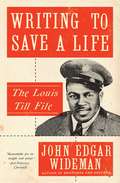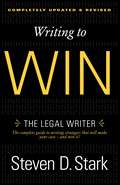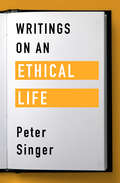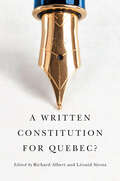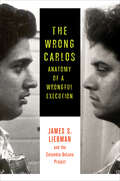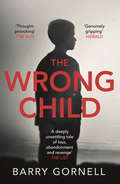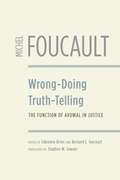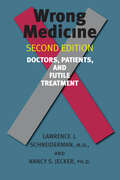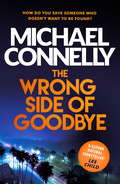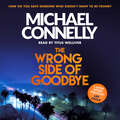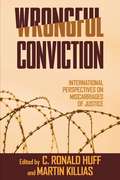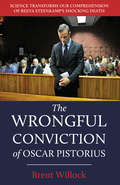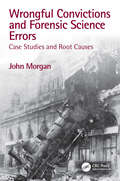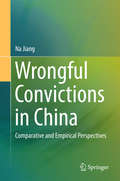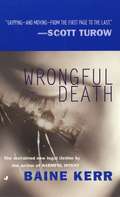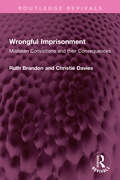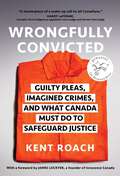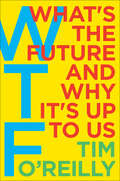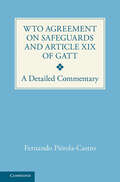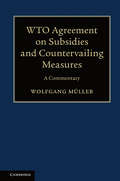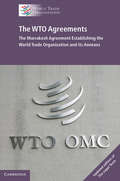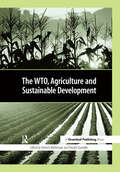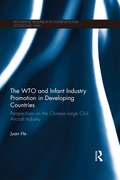- Table View
- List View
Writing to Save a Life: The Louis Till File (Canons #84)
by John Edgar WidemanAn award-winning writer traces the life of the father of iconic Civil Rights martyr Emmett Till--a man who was executed by the Army ten years before Emmett's murder. An evocative and personal exploration of individual and collective memory in America by one of the most formidable Black intellectuals of our time.In 1955, Emmett Till, aged fourteen, traveled from his home in Chicago to visit family in Mississippi. Several weeks later he returned, dead; allegedly he whistled at a white woman. His mother, Mamie, wanted the world to see what had been done to her son. She chose to leave his casket open. Images of her brutalized boy were published widely. While Emmett's story is known, there's a dark side note that's rarely mentioned. Ten years earlier, Emmett's father was executed by the Army for rape and murder. In Writing to Save a Life, John Edgar Wideman searches for Louis Till, a silent victim of American injustice. Wideman's personal interaction with the story began when he learned of Emmett's murder in 1955; Wideman was also fourteen years old. After reading decades later about Louis's execution, he couldn't escape the twin tragedies of father and son, and tells their stories together for the first time. Author of the award-winning Brothers and Keepers, Wideman brings extraordinary insight and a haunting intimacy to this devastating story. An amalgam of research, memoir, and imagination, Writing to Save a Life is completely original in its delivery--an engaging and enlightening conversation between generations, the living and the dead, fathers and sons. Wideman turns seventy-five this year, and he brings the force of his substantial intellect and experience to this beautiful, stirring book, his first nonfiction in fifteen years.
Writing to Win: The Legal Writer
by Steven D. StarkFrom a master teacher, a results-oriented approach to powerful legal writing that communicates, that persuades--and that wins.Of all the professions, the law has the most deserved reputation for opaque, jargon-clogged writing. Legal education, which focuses on judicial opinions, not instruments of persuasion, is partly to blame. Yet forceful writing is one of the most potent weapons of legal advocacy. In Writing to Win, Steve Stark, a former teacher of writing at Harvard Law, who has taught thousands of aspiring and practicing lawyers, has written the only book on the market that applies the universal principles of vigorous prose to the job of making a case--and winning it.Writing to Win focuses on the writing of lawyers, not judges, and includes dozens of examples of effective (and ineffective) real-life writing--as well as models drawn from advertising, journalism, and fiction. It deals with the problems lawyers face in writing, from organization to strengthening and editing prose; teaches ways of improving arguments; addresses litigation and technical writing in all its forms; and covers the writing attorneys must perform in their practice, from memos and letters to briefs and contracts. Each chapter opens with a succinct set of rules for easy reference.No other legal writing book on the market is as practical, as focused on results, as well written as Writing to Win.From the Trade Paperback edition.
Writings on an Ethical Life (Isnm Ser. #Vol. 138)
by Peter SingerThe essential collection of writings by one of the most visionary and daring philosophers of our time Since bursting sensationally into the public consciousness in 1975 with his groundbreaking work Animal Liberation, Peter Singer has remained one of the most provocative ethicists of the modern age. His reputation, built largely on isolated incendiary quotations and outrage-of-the-moment news coverage, has preceded him ever since. Aiming to present a more accurate and thoughtful picture of Singer's pioneering work, Writings on an Ethical Life features twenty-seven excerpts from some of his most lauded and controversial essays and books. The reflections on life, death, murder, vegetarianism, poverty, and ethical living found in these pages come together in a must-read collection for anyone seeking a better understanding of the issues that shape our world today. This ebook features an illustrated biography of Peter Singer, including rare photos from the author's personal collection.
A Written Constitution for Quebec? (Democracy, Diversity, and Citizen Engagement Series)
by Richard Albert and Léonid SirotaNo province in Canada has codified a written constitution, and whether Quebec should be the first remains a controversial question. A Written Constitution for Quebec? enters into the debate, drawing a roadmap through the legal, political, and constitutional terrain of the issue. Leading scholars each take their own position in the debate, examining the issue from various sides and exploring the forms and limits of a codified Quebec constitution by asking whether Quebec should adopt a written constitution, how the province might go about it, and what such a document might achieve. Along with a comprehensive introduction to constitutional codification and how it relates to Quebec, the book opens with a proposal for a written constitution, with the analyses that follow expressing a diversity of views on the feasibility and desirability of a written constitution for the province. An array of perspectives through the lenses of Indigenous inclusion and reconciliation, interculturalism and democratic constitutionalism, and insights from other federal and plurinational states – are included in this wide-ranging volume. Taking a doctrinal, historical, theoretical, and comparative approach, A Written Constitution for Quebec? extensively addresses Quebec’s constitutional future in Canada.
The Wrong Carlos: Anatomy of a Wrongful Execution
by James Liebman Shawn Crowley Andrew Markquart Lauren Rosenberg Lauren White Daniel ZharkovskyIn 1989, Texas executed Carlos DeLuna, a poor Hispanic man with childlike intelligence, for the murder of Wanda Lopez, a convenience store clerk. His execution passed unnoticed for years until a team of Columbia Law School faculty and students almost accidentally chose to investigate his case and found that DeLuna almost certainly was innocent. They discovered that no one had cared enough about either the defendant or the victim to make sure the real perpetrator was found. Everything that could go wrong in a criminal case did. This book documents DeLuna's conviction, which was based on a single, nighttime, cross-ethnic eyewitness identification with no corroborating forensic evidence. At his trial, DeLuna's defense, that another man named Carlos had committed the crime, was not taken seriously. The lead prosecutor told the jury that the other Carlos, Carlos Hernandez, was a "phantom" of DeLuna's imagination. In upholding the death penalty on appeal, both the state and federal courts concluded the same thing: Carlos Hernandez did not exist.The evidence the Columbia team uncovered reveals that Hernandez not only existed but was well known to the police and prosecutors. He had a long history of violent crimes similar to the one for which DeLuna was executed. Families of both Carloses mistook photos of each for the other, and Hernandez's violence continued after DeLuna was put to death. This book and its website (thewrongcarlos.net) reproduce law-enforcement, crime lab, lawyer, court, social service, media, and witness records, as well as court transcripts, photographs, radio traffic, and audio and videotaped interviews, documenting one of the most comprehensive investigations into a criminal case in U.S. history. The result is eye-opening yet may not be unusual. Faulty eyewitness testimony, shoddy legal representation, and prosecutorial misfeasance continue to put innocent people at risk of execution. The principal investigators conclude with novel suggestions for improving accuracy among the police, prosecutors, forensic scientists, and judges.
The Wrong Carlos: Anatomy of a Wrongful Execution
by James S. Liebman The Columbia DeLuna ProjectA Columbia Law School team&’s in-depth examination of one man&’s 1989 wrongful conviction and execution for murder. In 1989, Texas executed Carlos DeLuna, a poor Hispanic man with childlike intelligence, for the murder of Wanda Lopez, a convenience store clerk. His execution passed unnoticed for years until a team of Columbia Law School faculty and students chose to investigate his case and found that DeLuna almost certainly was innocent. No one had cared enough about either the defendant or the victim to make sure the real perpetrator was found. Everything that could go wrong in a criminal case did. DeLuna&’s conviction was based on a single, nighttime, cross-ethnic eyewitness identification with no corroborating forensic evidence. At his trial, DeLuna&’s defense—that another Carlos had committed the crime—was not taken seriously. The lead prosecutor told the jury that the other Carlos, Carlos Hernandez, was a &“phantom&” of DeLuna&’s imagination. In upholding the death penalty on appeal, both the state and federal courts concluded the same thing: Carlos Hernandez did not exist. However, he not only existed, but also had a long history of violent crimes . . . This book and its website (thewrongcarlos.net) reproduce law-enforcement, crime lab, lawyer, court, social service, media, and witness records, as well as court transcripts, photographs, radio traffic, and audio and videotaped interviews, documenting one of the most comprehensive investigations into a criminal case in US history. &“This book will become a classic in the field.&” —Austin Sarat, Amherst College &“[An] infuriating yet engrossing book on wrongful conviction...An important critique of our legal system.&” —Publishers Weekly
The Wrong Child: A gripping thriller you won't be able to put down
by Barry GornellHow far would you go to protect your child?When tragedy strikes in a small Scottish village, everyone in the community is affected.Most people believe one child is to blame for what happened.But could a young boy really be responsible? And what lengths will his parents go to protect him?THE WRONG CHILD is the most thought-provoking novel of 2018, perfect for fans of WE NEED TO TALK ABOUT KEVIN by Lionel Shriver and MY ABSOLUTE DARLING by Gabriel Tallent.****************READERS ARE CALLING THE WRONG CHILD 'UNFORGETTABLE':'Amazing' - Amazon 5* review'A great page-turner!' Amazon 5* review'Hopefully it will receive the wider audience it so richly deserves' - Amazon 5* review'Challenges your notions and ideals of morality' - Amazon review'Will stick with you long after you finish it!' Amazon review****************What the critics are saying about THE WRONG CHILD:'A thought-provoking read' - THE SUN'Genuinely gripping' - THE HERALD'A study of guilt and grief' - DAILY MAIL'Brilliant, but dark as hell' - METRO'Astonishing' - PSYCHOLOGIES'So visceral it seeps into your pores' - DAILY RECORD'Stunning. Macabre, unsettling and beautifully poetic' - BRIAN CONAGHAN, Costa Award winning author
Wrong-Doing, Truth-Telling: The Function of Avowal in Justice
by Michel Foucault edited by Fabienne Brion Bernard E. Harcourt translated by Stephen W. SawyerThree years before his death, Michel Foucault delivered a series of lectures at the Catholic University of Louvain that until recently remained almost unknown. These lectures--which focus on the role of avowal, or confession, in the determination of truth and justice--provide the missing link between Foucault's early work on madness, delinquency, and sexuality and his later explorations of subjectivity in Greek and Roman antiquity. Ranging broadly from Homer to the twentieth century, Foucault traces the early use of truth-telling in ancient Greece and follows it through to practices of self-examination in monastic times. By the nineteenth century, the avowal of wrongdoing was no longer sufficient to satisfy the call for justice; there remained the question of who the "criminal" was and what formative factors contributed to his wrong-doing. The call for psychiatric expertise marked the birth of the discipline of psychiatry in the nineteenth and twentieth centuries as well as its widespread recognition as the foundation of criminology and modern criminal justice. Published here for the first time, the 1981 lectures have been superbly translated by Stephen W. Sawyer and expertly edited and extensively annotated by Fabienne Brion and Bernard E. Harcourt. They are accompanied by two contemporaneous interviews with Foucault in which he elaborates on a number of the key themes. An essential companion to "Discipline and Punish," "Wrong-Doing, Truth-Telling" will take its place as one of the most significant works of Foucault to appear in decades, and will be necessary reading for all those interested in his thought.
Wrong Medicine: Doctors, Patients, and Futile Treatment
by Lawrence J. Schneiderman Nancy S. JeckerToo often, patients in American hospitals are subjected to painful, expensive, and futile treatments because of a physician’s notion of medical duty or a family’s demands. Lawrence J. Schneiderman and Nancy S. Jecker renew their call for common sense and realistic expectations in medicine in this revised and updated edition of Wrong Medicine.Written by a physician and a philosopher—both internationally recognized experts in medical ethics—Wrong Medicine addresses key topics that have occupied the media and the courts for the past several decades, including the wrenching Terry Schiavo case. The book combines clear descriptions of ethical principles with real clinical stories to discuss the medical, legal, and political issues that confront doctors today as they seek to provide the best medical care to critically ill patients. The authors have added two chapters that outline theoretical, legislative, judicial, and clinical developments since the first edition. Based on the latest empirical research, Wrong Medicine continues to guide a broad range of health care professionals through the challenges of providing humane end-of-life care.
The Wrong Side of Goodbye (Harry Bosch Series #19)
by Michael ConnellyOnly Harry Bosch can uncover LA's darkest secrets in this new gripping thriller from global bestseller Michael Connelly.'What do you want me to do?' Bosch asked again.'I want you to find someone for me,' Vance said. 'Someone who might not have ever existed.'Harry Bosch is working as a part-time detective in the town of San Fernando outside of Los Angeles, when he gets the invitation to meet with the ageing aviation billionaire Whitney Vance. When he was eighteen Vance had a relationship with a Mexican girl called Vibiana Duarte, but soon after becoming pregnant she disappeared.Now, as he reaches the end of his life, Vance wants to know what happened to Vibiana and whether there is an heir to his vast fortune. And Bosch is the only person he trusts to undertake the assignment.Harry's aware that with such sums of money involved, this could be a dangerous undertaking - not just for himself, but for the person he's looking for - but as he begins to uncover Vibiana's tragic story, and finds uncanny links to his own past, he knows he cannot rest until he finds the truth.
The Wrong Side of Goodbye (Harry Bosch Series #19)
by Michael ConnellyOnly Harry Bosch can uncover LA's darkest secrets in this new gripping thriller from global bestseller Michael Connelly. Read by Titus Welliver, star of BOSCH.'What do you want me to do?' Bosch asked again.'I want you to find someone for me,' Vance said. 'Someone who might not have ever existed.'Harry Bosch is working as a part-time detective in the town of San Fernando outside of Los Angeles, when he gets the invitation to meet with the ageing aviation billionaire Whitney Vance. When he was eighteen Vance had a relationship with a Mexican girl called Vibiana Duarte, but soon after becoming pregnant she disappeared.Now, as he reaches the end of his life, Vance wants to know what happened to Vibiana and whether there is an heir to his vast fortune. And Bosch is the only person he trusts to undertake the assignment.Harry's aware that with such sums of money involved, this could be a dangerous undertaking - not just for himself, but for the person he's looking for - but as he begins to uncover Vibiana's tragic story, and finds uncanny links to his own past, he knows he cannot rest until he finds the truth.(p) 2016 Hachette Audio
Wrongful Conviction: International Perspectives on Miscarriages of Justice
by Martin Killias C. Ronald HuffImperfections in the criminal justice system have long intrigued the general public and worried scholars and legal practitioners. InWrongful Conviction, criminologists C. Ronald Huff and Martin Killias present an important collection of essays that analyzes cases of injustice across an array of legal systems, with contributors from North America, Europe and Israel. Using this cross-national perspective, the volume offers detailed discussions of specific legal systems while also considering issues that transcend national boundaries. Differences in court procedures are explained as contributors ask what role the respective criminal justice systems play in preventing or generating wrongful convictions. Most importantly, this collection includes a number of well-developed public-policy recommendations intended to reduce the instances of courts punishing innocents. It also offers suggestions for compensating more fairly those who are wrongfully convicted.
The Wrongful Conviction of Oscar Pistorius: Science Transforms our Comprehension of Reeva Steenkamp’s Shocking Death
by Brent WillockJust when the world thought Oscar Pistorius’ meteoric rise to Olympic glory and international celebrity had terminated abysmally in prison, Brent Willock’s scientific perspective reopens this gripping narrative for an astonishing re-view.Olympian Oscar Pistorius’ spectacular assent to fame ground to a screeching halt in the wee hours of Valentine’s Day, 2013. Hearing a sound emanating from his bathroom, he grabbed his pistol and he stumbled to the washroom, screaming at the intruders to leave. Fearing someone was about to emerge to harm him and his girlfriend, Reeva, he fired four bullets into the bathroom. Soon he realized he had killed his lover. Horrified, he summoned the authorities. The investigating detective believed this was yet another case of an escalating argument where a man murdered his partner. World opinion is split. Some believe Oscar. Others are convinced he committed a despicable crime of passion.Distinguished clinical psychologist Brent Willock brings an entirely new perspective to bear on these horrific events: that Oscar’s horrific actions occurred while he was in a state of paradoxical sleep, also known as parasomnia. Throughout this book, Willock uses scientific scrutiny and legal precedence to resolve the crucial anomalies surrounding the Oscar Pistorius trial. Willock also discusses how mental health experts and the defense team might have overlooked the hypothesis of parasomnia that could have exonerated Oscar.Millions who followed the Blade Runner’s astonishing achievements, uplifted and inspired by his triumph over physical adversity, were crushed by his precipitous plunge from grace. They were baffled. Even Oscar himself, in a television interview shortly before his sentencing, achingly asked, “I always think, How did this possibly happen? How could this have happened?” At last, Willock’s elegant work responds to these poignant questions that have so plagued and pained Reeva’s family, friends, Oscar, and, indeed, the world.
Wrongful Convictions and Forensic Science Errors: Case Studies and Root Causes
by John MorganForensic Science Errors and Wrongful Convictions: Case Studies and Root Causes provides a rigorous and detailed examination of two key issues: the continuing problem of wrongful convictions and the role of forensic science in these miscarriages of justice. This comprehensive textbook covers the full breadth of the topic. It looks at each type of evidence, historical factors, system issues, organizational factors, and individual examiners. Forensic science errors may arise at any time from crime scene to courtroom. Probative evidence may be overlooked at the scene of a crime, or the chain of custody may be compromised. Police investigators may misuse or ignore forensic evidence. A poorly-trained examiner may not apply the accepted standards of the discipline or may make unsound interpretations that exceed the limits of generally accepted scientific knowledge. In the courtroom, the forensic scientist may testify outside the standards of the discipline or fail to present exculpatory results. Prosecutors may suppress or mischaracterize evidence, and judges may admit testimony that does not conform to rules of evidence. All too often, the accused will not be afforded an adequate defense—especially given the technical complexities of forensic evidence. These issues do not arise in a vacuum; they result from system issues that are discernable and can be ameliorated. Author John Morgan provides a thorough discussion of the policy, practice, and technical aspects of forensic science errors from a root-cause, scientific analysis perspective. Readers will learn to analyze common issues across cases and jurisdictions, perform basic root cause analysis, and develop systemic reforms. The reader is encouraged to assess cases and issues without regard to preconceived views or prejudicial language. As such, the book reinforces the need to obtain a clear understanding of errors to properly develop a set of effective scientific, procedural, and policy reforms to reduce wrongful convictions and improve forensic integrity and reliability. Written in a format and style accessible to a broad audience, Forensic Science Errors and Wrongful Convictions presents a thorough analysis across all of these issues, supported by detailed case studies and a clear understanding of the scientific basis of the forensic disciplines.
Wrongful Convictions in China
by Na JiangThe primary focus of this comparative and empirical work is to address wrongful convictions between China and common-law countries in order to promote a better understanding of wrongful convictions in China's practice with the help of comparative analyses, verifiable and empirical data and case studies. It examines the scope of wrongful convictions and offers new insights into the worldwide movement to prevent them, assesses how far it has progressed and what reforms are most needed. The book suggests that adversarial and inquisitorial systems alike could benefit from this research and learn valuable lessons from one another on how to effectively reduce the risk of wrongful convictions.
Wrongful Death
by Baine KerrA man crushed between locomotives at a Wyoming switching yard... the mass murder of patients in a hospital in the former Yugoslavia. . . the wrongful death of a comatose woman. As attorney Elliot Stone starts piecing together a three-part Chinese puzzle, one question echoes through it all: How can the good do evil?
Wrongful Imprisonment: Mistaken Convictions and their Consequences (Routledge Revivals)
by Ruth Brandon Christie DaviesFirst published in 1973, Wrongful Imprisonment aims to combine the human interest of individual cases of wrongful imprisonment with a general analysis of how and why they occur. It deals in detail with the English system, but also provides comparisons with Scotland, France, and the United States. The authors spent three years collecting material from newspaper reports, trial transcripts, books, lawyers, the Home Office and – most important – interviews with the persons concerned. As a result, they have been able to analyse objectively the existing system of justice; they have isolated and identified the areas in which the system is at fault, and the successive hazards which may confront the innocent man suspected of a criminal offence; they have also revealed the many obstacles which have to be overcome by the wrongfully imprisoned man seeking to establish his innocence and regain his liberty. This topical and convincingly argued book should appeal not only to students of law and sociology, or to lawyers, policemen, criminals, and others involved in the system of criminal justice, but also to the man in the Wormwood Scrubs omnibus.
Wrongfully Convicted: Guilty Pleas, Imagined Crimes, and What Canada Must Do to Safeguard Justice
by Kent RoachA top legal scholar explains Canada&’s national tragedy of wrongful convictions, how anyone could be caught up in them, and what we can do to safeguard justice.Canada&’s legal system has a serious problem: a significant but unknown number of people have been convicted for crimes they didn&’t commit. There are famous cases of wrongful convictions, such as David Milgaard and Donald Marshall Jr., where the system convicted the wrong person for murder. But there are lesser-known cases: people who feel they have no option but to plead guilty, and people convicted of crimes that were imagined by experts or the police that never, in fact, happened. Kent Roach, cofounder of the Canadian Registry of Wrongful Convictions, award-winning author, and law professor, has dedicated his illustrious career to documenting flaws in our justice system. His work reveals that the burden of wrongful convictions falls disproportionately on the disadvantaged, including Indigenous and racialized people, those with cognitive issues, single mothers, and the poor. Wrongfully Convicted raises awareness about wrongful convictions at a time when DNA exonerations are less frequent and the memories of most famous wrongful convictions are fading. Roach makes a compelling case for change that governments have so far lacked the courage to make. They include better legislative regulation of police and forensic experts and the creation of a permanent and independent federal commission both to investigate wrongful convictions and their multiple causes. Roach&’s research and vast knowledge point to systemic failings in our legal system. But he also outlines vital changes that can better prevent and correct wrongful convictions. Until we do, many of the wrongfully convicted are still waiting for the promise of justice. It is an issue that affects all Canadians.
WTF?: What's the Future and Why It's Up to Us
by Tim O'ReillyWTF? can be an expression of amazement or an expression of dismay. In today’s economy, we have far too much dismay along with our amazement, and technology bears some of the blame. In this combination of memoir, business strategy guide, and call to action, Tim O'Reilly, Silicon Valley’s leading intellectual and the founder of O’Reilly Media, explores the upside and the potential downsides of today's WTF? technologies. What is the future when an increasing number of jobs can be performed by intelligent machines instead of people, or done only by people in partnership with those machines? What happens to our consumer based societies—to workers and to the companies that depend on their purchasing power? Is income inequality and unemployment an inevitable consequence of technological advancement, or are there paths to a better future? What will happen to business when technology-enabled networks and marketplaces are better at deploying talent than traditional companies? How should companies organize themselves to take advantage of these new tools? What’s the future of education when on-demand learning outperforms traditional institutions? How can individuals continue to adapt and retrain? Will the fundamental social safety nets of the developed world survive the transition, and if not, what will replace them? O'Reilly is "the man who can really can make a whole industry happen," according to Eric Schmidt, Executive Chairman of Alphabet (Google.) His genius over the past four decades has been to identify and to help shape our response to emerging technologies with world shaking potential—the World Wide Web, Open Source Software, Web 2.0, Open Government data, the Maker Movement, Big Data, and now AI. O’Reilly shares the techniques he's used at O’Reilly Media to make sense of and predict past innovation waves and applies those same techniques to provide a framework for thinking about how today’s world-spanning platforms and networks, on-demand services, and artificial intelligence are changing the nature of business, education, government, financial markets, and the economy as a whole. He provides tools for understanding how all the parts of modern digital businesses work together to create marketplace advantage and customer value, and why ultimately, they cannot succeed unless their ecosystem succeeds along with them.The core of the book's call to action is an exhortation to businesses to DO MORE with technology rather than just using it to cut costs and enrich their shareholders. Robots are going to take our jobs, they say. O'Reilly replies, “Only if that’s what we ask them to do! Technology is the solution to human problems, and we won’t run out of work till we run out of problems." Entrepreneurs need to set their sights on how they can use big data, sensors, and AI to create amazing human experiences and the economy of the future, making us all richer in the same way the tools of the first industrial revolution did. Yes, technology can eliminate labor and make things cheaper, but at its best, we use it to do things that were previously unimaginable! What is our poverty of imagination? What are the entrepreneurial leaps that will allow us to use the technology of today to build a better future, not just a more efficient one? Whether technology brings the WTF? of wonder or the WTF? of dismay isn't inevitable. It's up to us!
WTO Agreement on Safeguards and Article XIX of GATT: A Detailed Commentary
by Fernando Piérola-CastroDrawing upon Fernando Piérola-Castro's extensive experience as a WTO practitioner, this book is a comprehensive and up-to-date overview of safeguard measures. With each chapter exploring a different provision of the agreement, it explores the relevant rules and procedures that govern safeguard investigations, the imposition of measures, the question of consultations and rebalancing and the multilateral transparency requirements of notification. Grounded in relevant case law, this book emphasises practice, logistics and risk management. Without focussing on the practice of any particular jurisdiction, it offers a general framework that can be applied to several domestic laws. It is a practical manual with the view of assisting in day-to-day problems in the handling of safeguard matters.
WTO Agreement on Subsidies and Countervailing Measures: A Commentary
by Wolfgang MüllerPanels and the WTO Appellate Body have rendered a large number of complex and lengthy rulings on the Agreement on Subsidies and Countervailing Measures. The reasoning behind these rulings is often intimately linked to the underlying facts of a particular case and the methods of litigation adopted by the parties. Without guidance, it is difficult to find and research a specific subsidy issue quickly. This book provides an essential article-by-article commentary on the Agreement and sets out the law as it emerges from this body of rulings, providing the legal basis for further analysis of subsidy disciplines within the realms of economics and political science. It also includes a useful summary of the negotiating history and the links to other WTO Agreements such as GATT 1994. This important reference work will appeal to international trade lawyers, government officials, researchers, students of international trade law, business associations and NGOs. Provides an article-by-article commentary of the Agreement in simple language, encouraging a fuller understanding of the Agreement's provisions. Includes an overview of the relevant jurisprudence so that the reader can locate specific areas of interest. Considers relevant scholarly writing, enabling the reader to gain a broader perspective beyond the Agreement itself.
The WTO Agreements: The Marrakesh Agreement Establishing the World Trade Organization and its Annexes
by World Trade OrganizationThis publication contains the text of the WTO's founding agreement, the 1994 Marrakesh Agreement Establishing the World Trade Organization, and its Annexes, including all amendments and additions since its entry into force until September 2017. <P><P>These include an amendment to the WTO's intellectual property agreement (TRIPS Agreement) aimed at improving developing countries' access to medicines, the WTO's Trade Facilitation Agreement, which entered into force in February 2017, an amendment adopted in July 2017 to extend the frequency of peer review periods under the Trade Policy Review Mechanism as of 2019, and the amended Government Procurement Agreement. <P>This publication updates and replaces The Legal Texts: The Results of the Uruguay Round of Multilateral Trade Negotiations, which was first printed in 1994. <P>Includes the complete and official texts of the WTO agreements in one collection.<P> Provides an indispensable guide to all WTO trade-related negotiations.<P> Updates and replaces The Legal Texts: The Results of the Uruguay Round of Multilateral Trade Negotiations (1994).
The WTO, Agriculture and Sustainable Development
by Heinrich Wohlmeyer Theodor QuendlerDespite the Doha declaration of November 2001, the failure to start a new round of global trade negotiations at Seattle in December 1999 and the hostility of protesters to the trade liberalization process and growing global economic and social disparities was a wake-up call for the World Trade Organisation (WTO). The ambitious goal of this ground-breaking book is to identify the strengths and weaknesses of liberalized world trade, in particular in the agricultural sector, and to investigate to what extent the current WTO agreements provide the necessary fail-safe devices to react to trade-related negative impacts on sustainability, environmental protection and food security. The background and interrelationship between the WTO, the tenets of sustainable development and the unique features of the agriculture and forestry sectors are explored, and conclusions regarding the deficits of the world trade system and its conflicts with basic societal goals – such as sustainability – are drawn. Agriculture and forestry have a particular affinity with what the authors call "strong sustainability" and are to be among the major agenda items in forthcoming WTO negotiations. The book proposes that sustainable agricultural production techniques such as integrated and organic farming provide a series of related services to community and environment which could be severely prejudiced by wholesale trade liberalization and the imposition of the large-scale production methods of the mega-trade giants of the USA and Europe. And yet the concept of sustainability is referred to only tangentially in the existing WTO agenda. The WTO, Agriculture and Sustainable Development argues that, without a formal recognition of this failing, the premise that free trade is inherently advantageous for all countries is a falsehood. Further, unfettered liberalization is unsustainable and a social and environmental multilateral framework must be agreed to reinterpret or adapt a host of WTO regulations that are at odds with sustainable development. The core problem is that, under the current system, import duties can only be differentiated by direct goods and services and not by their means of production – sustainable or otherwise. Therefore, a range of environmental policy measures in the agricultural sector, such as the consideration of product life-cycles, the internalization of external costs and a coupling of trade liberalization with ecological obligations are proposed by the authors. In addition, they argue that unsustainable economic short-termism must be curbed and the use of the stick of trade sanctions and the carrot of financial benefits for good environmental performance be permitted to promote sustainable agricultural practices. This book will contribute greatly in addressing the lack of basic theoretical arguments at the intersection between trade and sustainable development – a failing that has already been bemoaned by trade policy-makers. It is highly recommended reading for all those involved or interested in the WTO negotiations, whether from multilateral organizations, governments, industry or civil society.
WTO Analytical Index
by Legal Affairs Division World Trade OrganizationThe WTO Analytical Index is a comprehensive guide to the interpretation and application of the WTO Agreements by the Appellate Body, dispute settlement panels and other WTO bodies. It contains extracts of key pronouncements and findings from tens of thousands of pages of WTO jurisprudence, including panel reports, Appellate Body reports, Article 21.3(c) awards and Article 22.6 decisions. This unique work will be of assistance to anyone working in the field of WTO law, including lawyers, economists, academics and students. It is produced by the Legal Affairs Division of the WTO Secretariat with contributions from other divisions of the Secretariat and the Appellate Body Secretariat. The third edition of the WTO Analytical Index covers developments in WTO law and practice over the period January 1995 to September 2011.
The WTO and Infant Industry Promotion in Developing Countries: Perspectives on the Chinese Large Civil Aircraft (Routledge Research in International Economic Law)
by Juan HeThe charter of the World Trade Organization (WTO) sets the tone that sustainable trade and economic development dominates multilateral trade negotiation and specific working agreements. This book examines the novel challenge for developing countries to upgrade and optimize their industrial structure and trade composition by stimulating genuinely innovative and competitive industrial strength. The book specifically explores the issue of infant industry promotion under the legal framework of the WTO treaties and case law. Taking the regulatory measures and incentives China has used to build up a large civil aircraft supplier, the book evaluates the key trade agreements relevant to infant industry promotional policies and practices, such as product regulations and standards under the 'Agreement on Technical Barriers to Trade', and export promotion policies under the 'Agreement on Subsidies and Countervailing Measures'. Juan He argues that the regulatory room prescribed by the multilateral trade rules of the WTO does not allow adequate space for developing countries to encourage new and technologically advanced areas of production and trade. The author concludes by suggesting ways in which WTO rules could be modified to help enable developing countries’ industrialization. In doing so, the book highlights a need to investigate how localized and international policy trends can be reconciled and enhanced towards the common goal of development. The book will be of great interest to scholars and students of international trade law, Chinese studies, international political economy, and of great use to government agencies responsible for internal trade and industrial policy decisions.
